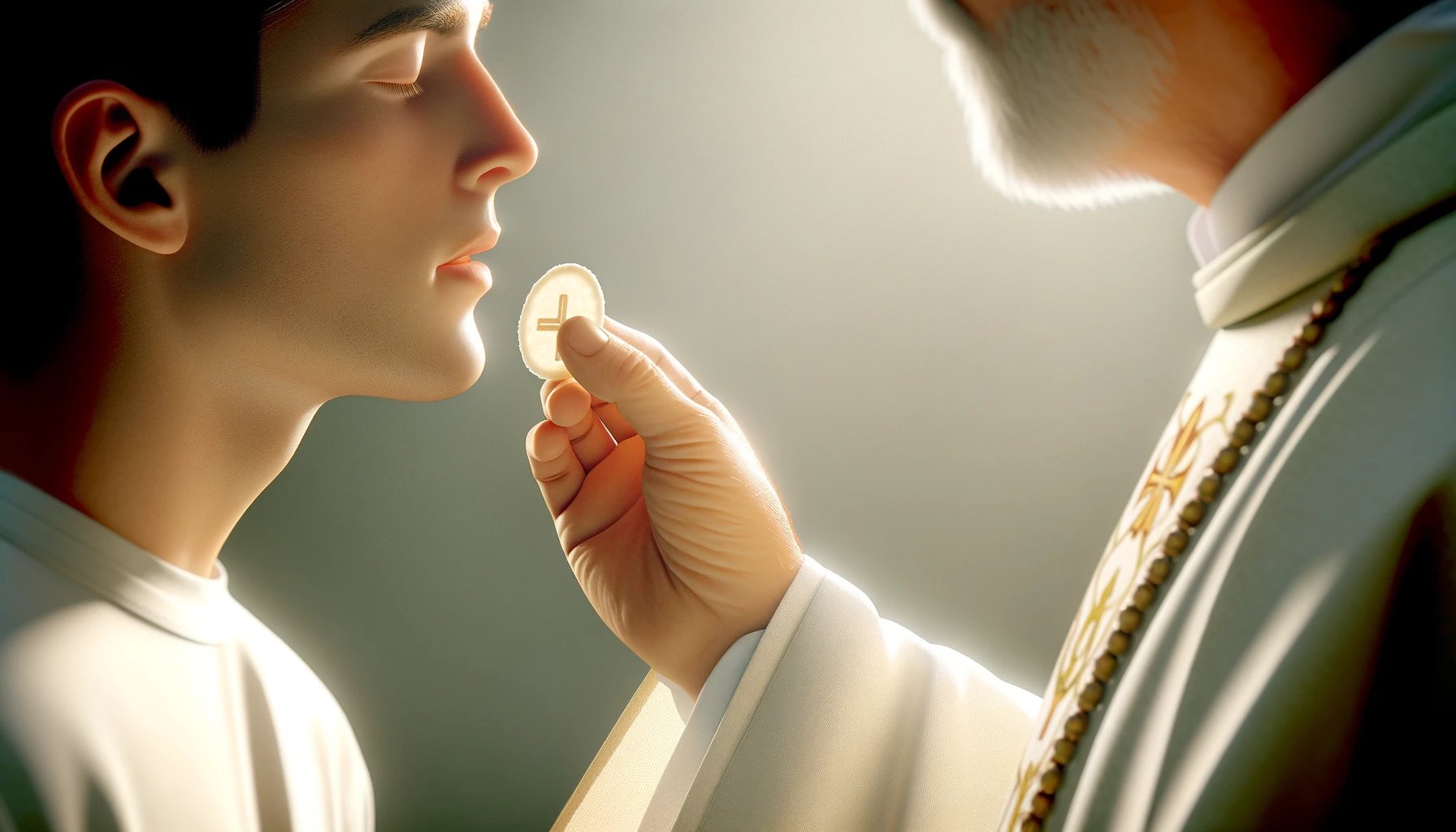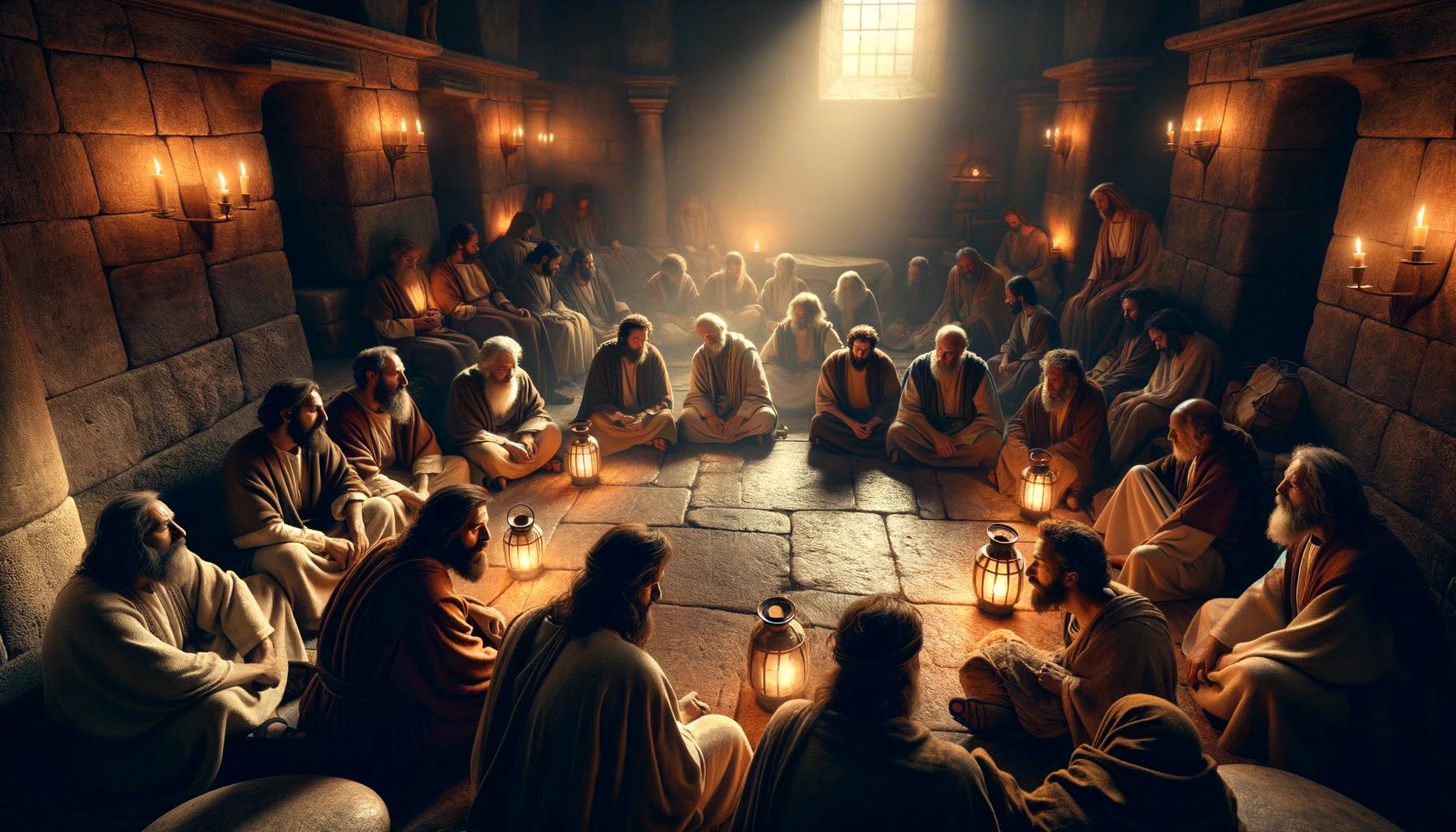Home>Theology and Spirituality>How Many Times Can A Catholic Receive Holy Communion In One Day


Theology and Spirituality
How Many Times Can A Catholic Receive Holy Communion In One Day
Published: February 24, 2024
Jason DeRose, Managing Editor at Christian.net, uses his expertise in religion and journalism to deepen understanding of faith's societal impacts. His editorial leadership, coupled with a strong academic background, enriches the platform’s diverse content, earning him recognition in both journalism and religious circles.
Learn about the Catholic Church's guidelines for receiving Holy Communion multiple times in a day. Understand the theology and spirituality behind this practice.
(Many of the links in this article redirect to a specific reviewed product. Your purchase of these products through affiliate links helps to generate commission for Christian.net, at no extra cost. Learn more)
Table of Contents
Introduction
Receiving Holy Communion is a sacred and deeply meaningful practice within the Catholic faith. It is a moment of profound spiritual significance, symbolizing the union of the believer with the body and blood of Christ. The act of receiving Holy Communion is rooted in the Last Supper, where Jesus shared bread and wine with his disciples, instructing them to partake in remembrance of him.
For Catholics, the Eucharist, or Holy Communion, holds a central place in their spiritual lives. It is a sacrament that signifies the real presence of Jesus Christ, and the faithful believe that through this sacred act, they are nourished spiritually and brought closer to God. The Catholic Church places great emphasis on the reverence and devotion with which the faithful approach the reception of Holy Communion, underscoring its significance as a moment of intimate connection with the divine.
Understanding the guidelines and teachings surrounding the reception of Holy Communion is essential for Catholics as they seek to participate in this sacred ritual in a manner that aligns with the teachings of their faith. The frequency and manner in which Holy Communion is received are governed by specific principles and regulations established by the Church, reflecting its reverence for the Eucharist and the spiritual well-being of the faithful.
In the following sections, we will delve into the Catholic Church's teachings on receiving Holy Communion, exploring the number of times a Catholic can receive Holy Communion in one day, exceptions to the general rule, and the importance of approaching this sacrament with a heart and mind prepared to receive the grace it imparts. Through this exploration, we aim to shed light on the significance of Holy Communion within the Catholic tradition and provide clarity on the guidelines that shape this sacred practice.
The Catholic Church's teachings on receiving Holy Communion
The Catholic Church's teachings on receiving Holy Communion are deeply rooted in its rich theological and spiritual traditions. Central to these teachings is the belief in the real presence of Jesus Christ in the Eucharist, where the consecrated bread and wine become the body and blood of Christ. This profound understanding shapes the Church's approach to the reception of Holy Communion, emphasizing the sacred nature of this sacrament and the disposition with which it should be approached.
At the heart of the Church's teachings is the concept of worthy reception. Catholics are called to approach the reception of Holy Communion with reverence, humility, and a clear conscience. The Catechism of the Catholic Church underscores the importance of being in a state of grace, free from mortal sin, when receiving the Eucharist. This requirement reflects the Church's commitment to upholding the sanctity of the sacrament and the spiritual well-being of the faithful.
Furthermore, the Church emphasizes the significance of proper preparation for receiving Holy Communion. This preparation includes participating in the Sacrament of Reconciliation, also known as Confession, to seek forgiveness for any serious sins that may have been committed. Through this sacrament, Catholics are reconciled with God and the Church, restoring their state of grace and readiness to receive the Eucharist.
In addition to the spiritual disposition of the individual, the Church also provides guidance on the physical observance of the Eucharistic fast. This practice involves abstaining from food and drink (with the exception of water and medicine) for a specific period before receiving Holy Communion. The purpose of the Eucharistic fast is to foster a spirit of self-discipline and to prepare the faithful to receive the body and blood of Christ with reverence and attentiveness.
The teachings of the Catholic Church on receiving Holy Communion reflect its profound reverence for the Eucharist as the source and summit of the Christian life. Through these teachings, the Church seeks to guide the faithful in approaching the reception of the Eucharist with a deep sense of awe, gratitude, and spiritual readiness. By upholding these teachings, Catholics are invited to enter into a profound encounter with the living Christ, nourishing their souls and deepening their communion with the divine.
In summary, the Catholic Church's teachings on receiving Holy Communion underscore the sacred nature of the Eucharist and the reverence with which it should be approached. These teachings serve as a guiding light for the faithful, shaping their understanding of the Eucharist as a transformative encounter with the real presence of Jesus Christ.
The number of times a Catholic can receive Holy Communion in one day
According to the current discipline of the Catholic Church, a Catholic may receive Holy Communion up to two times in one day. The first reception can occur during the celebration of the Eucharist, also known as the Mass. The second reception is permitted within the context of a Eucharistic celebration, such as participating in a wedding Mass, a funeral Mass, or a special Mass on holy days of obligation.
The Church's allowance for receiving Holy Communion twice in one day is rooted in its reverence for the Eucharist as the source and summit of the Christian life. This practice enables the faithful to partake in the sacrament within the sacred context of the Mass, where the body and blood of Christ are consecrated and offered to the faithful for spiritual nourishment.
The restriction of receiving Holy Communion twice in one day serves as a reminder of the sacrament's profound significance and the need for a balanced approach to its reception. By setting this limit, the Church encourages the faithful to approach the Eucharist with a sense of spiritual attentiveness and reverence, recognizing the transformative power of this sacred encounter with the real presence of Jesus Christ.
It is important to note that the Church's discipline regarding the frequency of receiving Holy Communion is designed to uphold the sanctity of the Eucharist and to guide the faithful in approaching this sacrament with a heart and mind prepared to receive the grace it imparts. By adhering to these guidelines, Catholics are invited to enter into the mystery of the Eucharist with a deep sense of reverence and spiritual readiness, fostering a profound encounter with the living Christ.
In summary, the Catholic Church permits the reception of Holy Communion up to two times in one day, emphasizing the sacred context of the Mass and the transformative nature of the Eucharist. This practice reflects the Church's commitment to preserving the sanctity of the sacrament and guiding the faithful in approaching the reception of the Eucharist with a deep sense of reverence and spiritual readiness.
Exceptions to the general rule
While the Catholic Church generally limits the reception of Holy Communion to two times in one day, there are exceptions to this rule that allow for additional receptions under specific circumstances. These exceptions serve to accommodate the spiritual needs of the faithful and ensure that they have access to the grace and nourishment offered through the Eucharist.
One notable exception pertains to the reception of Viaticum, which is the Eucharist administered to a person who is in danger of death. In such critical moments, when an individual is approaching the end of life, the Church permits the reception of Holy Communion as Viaticum, providing spiritual sustenance and comfort to the person as they prepare to pass from this life to the next. The administration of Viaticum underscores the Church's pastoral care for the dying, offering them the grace and presence of Christ in their final moments.
Additionally, there are circumstances where a Catholic may receive Holy Communion more than twice in one day due to participating in the celebration of the Eucharist in a specific role. For example, a priest who celebrates multiple Masses on the same day, such as during certain liturgical celebrations, may receive Holy Communion each time he celebrates the Mass. This exception recognizes the priest's unique pastoral responsibilities and the integral role he plays in leading the faithful in the celebration of the Eucharist.
Furthermore, individuals who are in attendance at a Mass where the celebrant receives Holy Communion more than once, as permitted by the Church's liturgical norms, may also receive Holy Communion each time the celebrant does. This exception aligns with the Church's recognition of the communal nature of the Eucharist and the spiritual unity shared by the faithful in the reception of the body and blood of Christ.
It is important to note that these exceptions are carefully delineated within the Church's teachings and disciplines, reflecting its commitment to preserving the sanctity of the Eucharist while also attending to the diverse pastoral needs of the faithful. By providing these exceptions, the Church demonstrates its pastoral sensitivity and care for the spiritual well-being of its members, ensuring that they have access to the grace and nourishment offered through the reception of Holy Communion in unique and critical circumstances.
In summary, while the general rule limits the reception of Holy Communion to two times in one day, exceptions exist to accommodate specific pastoral and spiritual needs, such as the administration of Viaticum and the unique roles of priests in celebrating the Eucharist. These exceptions reflect the Church's pastoral care for the faithful and its commitment to ensuring that they have access to the grace and nourishment offered through the reception of the Eucharist in diverse and critical situations.
The importance of receiving Holy Communion worthily
Receiving Holy Communion worthily is of paramount importance within the Catholic faith, reflecting the profound reverence and spiritual readiness with which the faithful are called to approach this sacred sacrament. The Catechism of the Catholic Church emphasizes the significance of being in a state of grace, free from mortal sin, when receiving the Eucharist. This requirement underscores the sanctity of the sacrament and the spiritual disposition necessary to fully partake in the transformative encounter with the real presence of Jesus Christ.
The act of receiving Holy Communion worthily is rooted in the understanding of the Eucharist as the source and summit of the Christian life. It is a moment of intimate communion with the divine, where the faithful are invited to partake in the body and blood of Christ, nourishing their souls and deepening their union with God. Approaching the reception of Holy Communion with a heart and mind prepared to receive the grace it imparts is essential for fostering a profound encounter with the living Christ and experiencing the spiritual nourishment offered through the Eucharist.
Furthermore, the importance of receiving Holy Communion worthily extends to the spiritual preparation that precedes the reception of the Eucharist. This preparation encompasses the Sacrament of Reconciliation, where Catholics seek forgiveness for serious sins, restoring their state of grace and spiritual readiness to partake in the Eucharist. Through this sacramental reconciliation, the faithful are invited to approach the reception of Holy Communion with humility, contrition, and a renewed commitment to living in accordance with the teachings of Christ.
In addition to the spiritual disposition of the individual, the Church also emphasizes the observance of the Eucharistic fast as a means of preparing to receive Holy Communion worthily. The practice of abstaining from food and drink (with the exception of water and medicine) before receiving the Eucharist fosters a spirit of self-discipline and attentiveness, allowing the faithful to approach the reception of the body and blood of Christ with reverence and spiritual readiness.
Receiving Holy Communion worthily is a testament to the Catholic Church's reverence for the Eucharist and its desire for the faithful to enter into this sacred encounter with a deep sense of awe, gratitude, and spiritual attentiveness. By upholding the importance of receiving Holy Communion worthily, the Church guides the faithful in approaching the Eucharist as a transformative moment of communion with the real presence of Jesus Christ, inviting them to partake in the spiritual nourishment and grace offered through this sacred sacrament.
In summary, the importance of receiving Holy Communion worthily underscores the sacred nature of the Eucharist and the spiritual disposition necessary to fully partake in this transformative encounter with the real presence of Jesus Christ. By approaching the reception of Holy Communion with reverence, humility, and a heart prepared to receive the grace it imparts, the faithful are invited to deepen their communion with the divine and experience the profound spiritual nourishment offered through the Eucharist.
Read more: How Do You Receive Holy Communion
Conclusion
In conclusion, the reception of Holy Communion holds profound significance within the Catholic faith, serving as a sacred moment of intimate communion with the real presence of Jesus Christ. The teachings of the Catholic Church on receiving Holy Communion underscore the reverence, spiritual readiness, and devotion with which the faithful are called to approach this sacrament. The Church's emphasis on worthy reception, spiritual preparation, and the observance of the Eucharistic fast reflects its commitment to upholding the sanctity of the Eucharist and guiding the faithful in experiencing the transformative grace offered through the reception of the body and blood of Christ.
The allowance for receiving Holy Communion up to two times in one day within the context of the Mass, along with the exceptions that accommodate specific pastoral and spiritual needs, reflects the Church's pastoral sensitivity and care for the diverse circumstances of the faithful. By providing these guidelines and exceptions, the Church seeks to ensure that the faithful have access to the grace and nourishment offered through the Eucharist while upholding the sacred nature of this sacrament.
Ultimately, the importance of receiving Holy Communion worthily underscores the spiritual disposition necessary for a profound encounter with the living Christ. Through the act of approaching the reception of Holy Communion with reverence, humility, and a heart prepared to receive the grace it imparts, the faithful are invited to deepen their communion with the divine and experience the transformative power of the Eucharist in their spiritual lives.
As Catholics seek to participate in the reception of Holy Communion, they are called to embrace the teachings and disciplines of the Church, approaching this sacred sacrament with a deep sense of awe, gratitude, and spiritual attentiveness. By doing so, they open themselves to the profound spiritual nourishment and grace offered through the Eucharist, fostering a deeper union with Christ and enriching their journey of faith.
In essence, the Catholic Church's teachings on receiving Holy Communion serve as a guiding light, inviting the faithful to enter into the mystery of the Eucharist with reverence and spiritual readiness, thereby experiencing the transformative encounter with the real presence of Jesus Christ.














